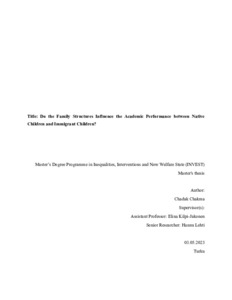Do the Family Structures Influence the Academic Performance between Native Children and Immigrant Children?
Chakma, Chadak (2023-05-03)
Do the Family Structures Influence the Academic Performance between Native Children and Immigrant Children?
Chakma, Chadak
(03.05.2023)
Julkaisu on tekijänoikeussäännösten alainen. Teosta voi lukea ja tulostaa henkilökohtaista käyttöä varten. Käyttö kaupallisiin tarkoituksiin on kielletty.
avoin
Julkaisun pysyvä osoite on:
https://urn.fi/URN:NBN:fi-fe2023060952982
https://urn.fi/URN:NBN:fi-fe2023060952982
Tiivistelmä
The study aims to find out the differences in academic performances among native, first-generation immigrant, and second-generation children when their family structure differs by two-parent families and single-parent families. Children of Finland and Great Britain are chosen from the PISA 2012 dataset for the analysis. Linear regression with stepwise models and interaction between immigration status and family structure has been used for the analysis. The study found that there is a significant difference in academic performance among Finnish native and immigrant children, however, after controlling Economic, Social, and Cultural status (ESCS), the significant association between academic performance and second-generation immigrant children has been lost. And no significant differences have been found when family structure interacts with immigrant status. Finnish native children who are raised by both parents have the highest significant PISA scores among all the groups of children and 1st generation immigrant children from one-parent families have the lowest estimated PISA scores. British 1st generation immigrant children with two-parent family backgrounds have the highest estimated PISA scores and British 2nd generation immigrant children from single-parent families have the lowest estimated PISA scores. Negative significant associations on academic differences have been found between native and second-generation immigrant groups. Correspondingly, a negative significant interaction effect has been found between family structure and second-immigrant status after controlling ESCS. According to the study, it can be argued that Finland’s 1st generation immigrant children and British second-generation children from one-parent families are having the double disadvantage of being immigrants and being single-parent families
